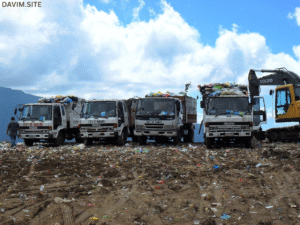
Waste management professions are more critical than ever at a time of environmental responsibility and climate change. The need for experts who can properly manage, minimise, and dispose of both solid and hazardous waste is rapidly rising as the globe generates ever more of it. The waste management sector can be the ideal choice for you if you’re seeking a meaningful career combining employment stability with environmental responsibility.
Everything you need to know about jobs in waste management—including job responsibilities, credentials, pay expectations, development potential, and starting points—is covered on this page.
Why Consider a Career in Waste Management?
There are several compelling reasons to consider working in the waste management industry:
-
Environmental Impact: Professionals in this field play a critical role in reducing pollution, preserving ecosystems, and promoting sustainability.
-
Job Stability: As waste generation is a constant issue, demand for skilled workers in this field remains high year-round.
-
Wide Range of Roles: From truck drivers and landfill operators to environmental engineers and sustainability analysts, the field offers a variety of career paths.
-
Growth Opportunities: With innovations in recycling and green technologies, new roles are emerging that offer upward mobility and competitive salaries.
Types of Waste Management Careers
The waste management industry encompasses many job roles, categorized into operational, technical, and managerial positions. Here are some of the most common:
1. Waste Collection and Transportation
These are the frontline workers who collect waste from residential, commercial, or industrial sites and transport it to processing or disposal facilities.
Common Job Titles:
-
Waste Collection Driver
-
Sanitation Worker
-
Recycling Truck Operator
Requirements: Generally, a high school diploma and a commercial driver’s license (CDL).
2. Waste Treatment and Disposal
These roles focus on treating, processing, or disposing of waste materials in environmentally safe ways.
Common Job Titles:
-
Landfill Operator
-
Incinerator Technician
-
Hazardous Waste Technician
Requirements: Technical training or associate degrees in environmental science, chemistry, or waste technology.
3. Recycling and Resource Recovery
This growing area of waste management is focused on reclaiming materials for reuse.
Common Job Titles:
-
Recycling Coordinator
-
Materials Recovery Facility (MRF) Technician
-
E-Waste Processor
Requirements: Often requires knowledge in sorting technologies, basic machinery, and safety regulations.
4. Environmental Engineering and Science
For those with technical backgrounds, this field offers roles in analyzing and solving complex waste-related issues.
Common Job Titles:
-
Environmental Engineer
-
Wastewater Treatment Specialist
-
Industrial Hygienist
Requirements: A bachelor’s or master’s degree in environmental science, engineering, or a related field.
5. Compliance and Safety
This sector ensures that waste management practices meet federal, state, and local regulations.
Common Job Titles:
-
Environmental Compliance Officer
-
Safety Coordinator
-
Regulatory Affairs Specialist
Requirements: Degree in environmental policy, public health, or law, plus familiarity with OSHA and EPA regulations.
6. Management and Administration
These roles oversee operations, budgets, and teams within the waste management system.
Common Job Titles:
-
Waste Management Supervisor
-
Facility Manager
-
Operations Director
Requirements: Bachelor’s degree in business administration or environmental management and several years of experience.
Education and Skills Needed
Educational Requirements:
-
Entry-level positions may only require a high school diploma or GED.
-
Mid-level roles often require associate or bachelor’s degrees.
-
Advanced roles typically require a bachelor’s or master’s degree in science, engineering, or environmental policy.
Key Skills for Success:
-
Knowledge of waste handling and disposal techniques
-
Understanding of environmental laws and regulations
-
Mechanical and technical aptitude
-
Project management and leadership skills
-
Attention to detail and safety consciousness
-
Strong communication and teamwork abilities
Certifications That Can Boost Your Career
Obtaining professional certifications can enhance your credentials and make you more competitive in the job market. Some notable certifications include:
-
Certified Waste Management Professional (CWMP)
-
Certified Environmental Specialist (CES)
-
Hazardous Waste Operations and Emergency Response (HAZWOPER)
-
LEED Accreditation (Leadership in Energy and Environmental Design)
-
OSHA Safety Certifications
Salary Expectations
Salaries in the waste management industry vary by role, location, and experience. Here’s a general breakdown:
| Job Title | Average Annual Salary (USD) |
|---|---|
| Waste Collection Driver | $40,000 – $60,000 |
| Recycling Coordinator | $50,000 – $75,000 |
| Environmental Engineer | $70,000 – $100,000 |
| Compliance Officer | $60,000 – $90,000 |
| Facility Manager | $80,000 – $120,000 |
Note: Salaries may vary significantly depending on geographic region and industry (public vs. private).
Job Outlook and Industry Growth
According to the U.S. Bureau of Labor Statistics, employment in environmental and waste management sectors is projected to grow faster than average over the next decade. Key growth drivers include:
-
Urbanization: Increased population density means more waste generation.
-
Regulatory Pressure: Governments are enforcing stricter regulations on waste disposal and sustainability.
-
Technology Advancements: Innovations in recycling and smart waste systems are creating new job roles.
-
Sustainability Goals: Corporations and municipalities are investing in sustainable waste practices, increasing demand for skilled professionals.
How to Start a Career in Waste Management
If you’re ready to dive into this high-demand field, here are some steps to help you get started:
Step 1: Assess Your Interests and Skills
Do you prefer field work or office-based roles? Are you more mechanical or analytical? Your answer will help guide your career path.
Step 2: Get Educated or Trained
Look for educational programs that match your desired job role. Community colleges, trade schools, and online programs offer flexible options.
Step 3: Gain Hands-On Experience
Entry-level jobs, internships, or apprenticeships can give you valuable on-the-ground experience and help you build your resume.
Step 4: Earn Relevant Certifications
Specialized certifications can distinguish you from other candidates and often lead to higher pay.
Step 5: Network in the Industry
Attend waste management conferences, join professional associations, and connect with others in the field via LinkedIn or industry forums.
Top Employers in Waste Management
Some of the biggest names in the industry include:
-
Waste Management, Inc.
-
Republic Services
-
Veolia North America
-
Clean Harbors
-
GFL Environmental
-
Local and Municipal Governments
These employers offer a range of benefits, training opportunities, and career advancement programs.
Tips for Advancing Your Career in Waste Management
-
Stay Current: Keep up with environmental laws, technology, and best practices.
-
Pursue Continuing Education: Attend workshops and pursue advanced degrees or certifications.
-
Be Proactive: Take on leadership roles and seek mentorship within your organization.
-
Document Your Achievements: Track your progress and highlight successful projects in your resume or portfolio.
-
Develop Soft Skills: Leadership, communication, and problem-solving are critical for managerial roles.
Conclusion
A career in waste management offers more than simply employment; it’s a chance to help to create a better, cleaner world while still enjoying work stability, fair pay, and future development possibilities. The waste management sector has a wide spectrum of possibilities for individuals at various education and experience levels, whether your career is just beginning or you are seeking a significant turnaround.
Right training, attitude, and dedication to environmental sustainability can help you create a fulfilling and successful profession that will last a lifetime.
